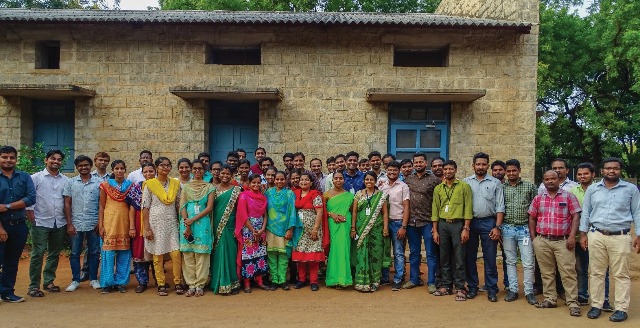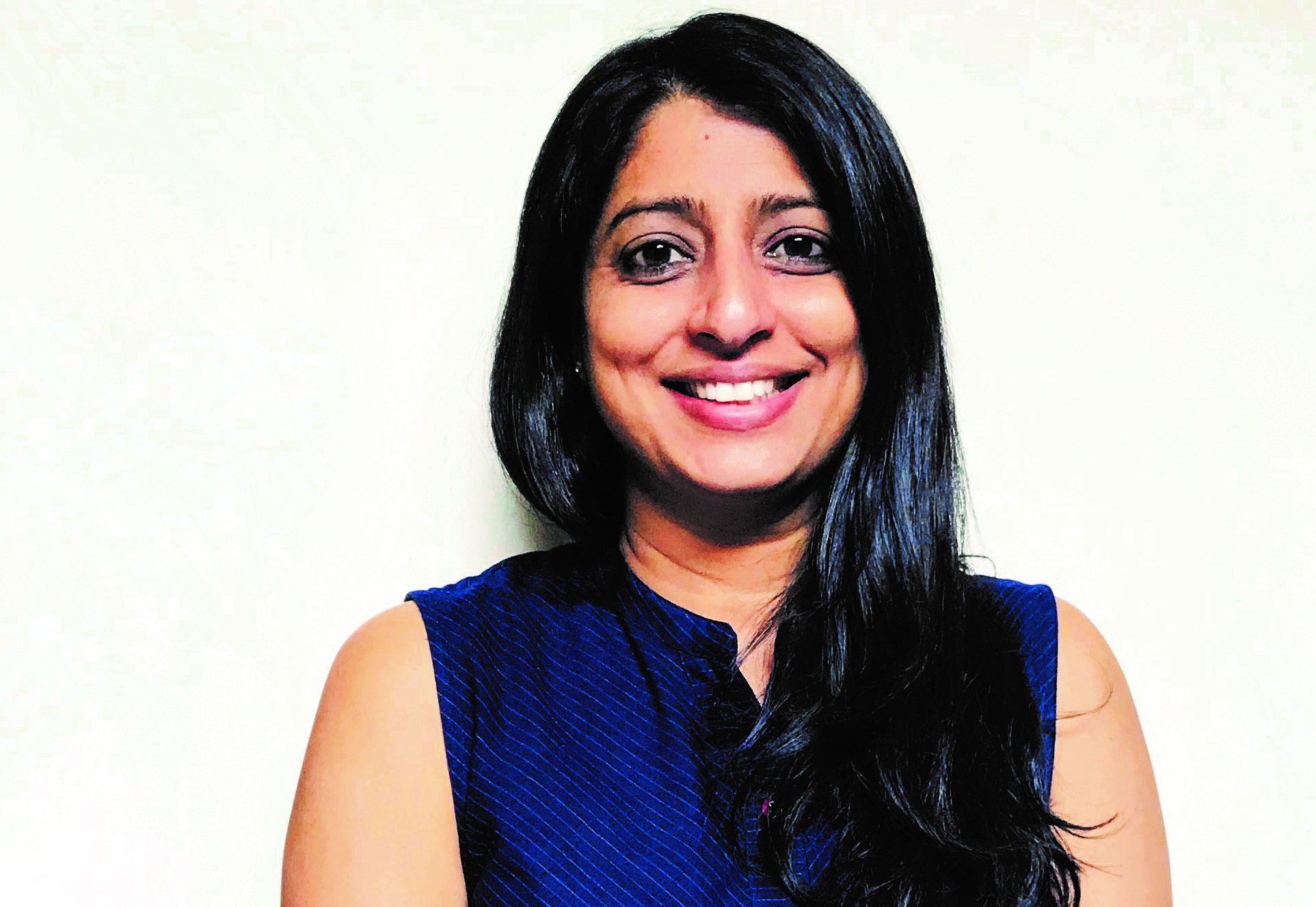It was not long time ago when Smita Malipatil was successfully running her digital Solution Company in UK. With offices in London and Bangalore, her company provided digital strategy and technical solutions for the world’s leading brands and advertising groups. In the early part of her career, Smita worked in different roles across Consulting, Business Development, Corporate Communications and Trade Relations with renowned companies like IBM, Dharma Systems, i2 Technologies.
The Alumnus of Harvard Business School with a dual MBA in Marketing and Finance, however, could not resist her urge to bring her professional expertise for larger social good. In 2018, Malipatil joined IndiVillage,a social enterprise that leverages the power of technology through impact sourcing.
As the Chief Empowerment Officer at IndiVillage, Smita is now bridging the gap between urban and rural India. Smita says that the model of IndiVillage is simple: We bring 21st-century technology jobs to rural communities, enable them to learn, earn and enrich their native communities.
The world’s leading technology companies have been quick to take notice of IndiVillage’s capabilities with Amazon, Mercato, Taranis, Appen, Alegion and Swiggy, partnering the social enterprise for its services that include data entry, image tagging, image editing, and other cutting-edge technology solutions.
Currently, IndiVillage employs more than 300 individuals from rural communities in its centres in Raichur district in Karnataka and Yemmiganur in Andhra Pradesh. In her leadership now, the social enterprise is now expanding to other parts of the country.
In this interview, Smita Malapatil talks about the "profit-for-all" model of IndiVillage. She also talks about challenges of running such social enterprises and opportunities that it brings to communities. She also shares insight on how it invests profits back into these communities through development activities such as clean drinking water, livelihood initiatives, healthcare and education.
Read this interview to know more about her professional journey, current role of empowering rural communities and plans to expand this model across India…
Interview with Smita Malipatil, Chief Empowerment Officer, IndiVillage

Q: Your venture is a perfect example of ‘enabling & empowering’ rural youth through a sustainable model. How has your journey been so far?
A: opened its doors to the first centre in Yemmiganur, Andhra Pradesh and began operations with less than 10 people in 2010. We turned profitable in 2012. In 2014, we commenced community development in Yemmiganur. In 2016 we opened the water filtration plant there. Our workforce touched the 100-employee mark in 2016.
In 2017, we became a B corp certified company and joined the Global Impact Sourcing Coalition. In 2018, our staff strength increased to 200 and we were runners up at the Entrepreneurs Organization Business Summit and Social Impact Awards ceremony. This year (2020), we have increased our staff strength to 300+ employees.
Over the last decade we’ve impacted more than 35,000 lives creating 776 jobs. 405 children have received education and meals at our school. 14,663,107 litres of water have been dispensed to 18,014 individuals. Nearly 12,000 patients have received care at our health centre.
Q: You have worked in multinational companies and also worked in the digital space? What was your thought process while starting this venture focused on the rural community?
A: IndiVillage was in fact started by Ravi Machhani who is a third-generation business owner. The founding philosophy of IndiVillage revolved around envisioning a world of equal opportunity between urban and rural areas in which rural areas are sustainable and thriving communities and are enabled to live, work and grow.
I joined IndiVillage as the CEO (Chief Empowerment Officer) in 2018. Prior to working with IndiVillage, I founded and ran Kieon, one of the UK’s leading digital agencies.
As the IndiVillage CEO, I am responsible for bringing to life the company’s agenda of ‘Business for Good.’ My vision for IndiVillage is centred on a greater impact on women and rural communities through thoughtful scale, responsible business, and employee-centred initiatives.
Q: What are the key challenges you face in training youth in rural villages and meeting client requirements?
A: Yes. Running of such a social enterprise is full of challenges. A few below:
- Gaining the community’s trust: Since our impact centres are located in rural India, it is important to be able to build trust and gain the confidence of the local population. They need to see us (IndiVillage) as an important contributing factor in the development of the community. In the last ten years of our existence, our workforce has grown to a total of 300 staff and community support and encouragement has played a huge role in this.
- Hesitation to send women to the workplace: At the start of the IndiVillage journey, rural families were initially concerned with allowing female members (wives, daughter) to work outside their home environment. Over time and after repeated engagement with community members, we were able to address this and the participation of women in our workforce is nearly 45%.
- Discomfort around the increased earning potential of women vis-a-vis men: In the ten years of our existence, we have had instances where some of our female employees were forced to quit by their family because the male members of their household were not happy with the women earning more than them. In such cases IndiVillage acted as a neutral mediator and some of those conflicts could be resolved with clear communication and understanding.
- Convincing international companies about the impact sourcing model: In the initial years, we faced some resistance from prospective clients and there were questions around being able to provide the required quality of work. However, we have gone past those hurdles and work with some of the world’s leading technology and E-commerce companies.
- Creating a formal work environment: Apart from creating employment opportunities, we had to also put efforts into creating a structured and formal work environment for our impact workers. As this is a first job for many of them, we are constantly improving our working culture.
Q: Your model is ‘profit for all’. What do you mean by this?
A: Indivillage provides data related services to AI/ML and e-commerce companies all over the world by training and employing youth. Companies can reduce costs, improve efficiencies and have access to high quality talent and secure services. Profits are channelled towards creating positive impact in communities. Clients therefore are also contributing towards creating positive change in under served communities in rural India.
For a majority of our employees, this is their first job and most of them also happen to be the only earning members in their families. Through IndiVillage, we have created a long-term sustainable employment opportunity within the community. By being able to earn a dependable income, they are able to educate their siblings, help their families break poverty cycles and get advanced degrees for themselves. By providing interesting work, a professional work environment and career growth to our workforce of 300, they are able to support a total ~ 1200 people who are direct dependents of our employees, thereby empowering them to live better lives.
Apart from creating livelihoods, we have, through our Primary School Initiative, been able to create an osmosis of learning and development in one of the most economically marginalised communities in the community. Every child who is a part of our Primary School Initiative is nurtured holistically through academic, nutritional and socio-emotional development. We also run a Drinking Water Initiative which brings mineral rich, clean drinking water free of cost to the most vulnerable families in the community, ensuring that they live a healthy, secure and disease-free life.
Q: COVID has made us all learn how to work remotely. How do you see this opportunity for your venture?
A: The year 2020, or the year of COVID as it will be called after this year has been quite pivotal for IndiVillage. In the beginning of March, when our team assessed the situation around the world and how countries started shutting down one by one, we realised that we have to prepare ourselves for the very real possibility of working from home. Our service level agreement requirements with our customers require us to maintain stringent data security and access regulations which is why the first task was for us to communicate with our customers, working with them on how to ascertain business continuity. After this, we formulated SOPs for the emerging situation and transitioned each employee to remote working. While we did face our share of initial hiccups and interruptions, it is safe to say that we were able to successfully transition to remote working.
This experience has opened new avenues of expansion for us and our venture. Previously, our expansion plans depended on setting up physical centres in various locations but with the new paradigm of remote working, this has changed. We can have people based out of anywhere in the country or elsewhere in the world plug into our set-up and get started. We are currently in the process of piloting this out of rural communities in Rajasthan, Gurgaon and Jammu. We are also working on setting up a platform that can be used to train, monitor and manage the work.
Q: How are you investing back your profit into the rural community?
A: All our profits support programs of the IndiVillage Foundation and that of other local non-profit organizations in our communities. The IndiVillage Foundation focuses on the areas of education, gender, and livelihoods. Its main programs are a child literacy intervention in partnership with a rural unaided primary school, a coding and soft skills development intervention for adolescent girls in government schools, and people development initiatives for the youth workers in its impact (livelihood) centres.
Additionally, through the Foundation and financial support from the LLP or the commercial operations, we are able to support a clean drinking water facility, a basic healthcare facility, education and nutrition at an unaided primary school, and community learning centres. As an organisation, we have also invested in adequate measures and relief efforts in response to the COVID outbreak in our communities.
Q: What is your plan for next 2-3 years?
A: Building on the success of our three current canters in Yemmiganur and Raichur, we aim to open additional new centers in 2020. Working with local partners in Rajasthan, Odisha and other northeastern states, we aim to transplant our successful impact outsourcing model to empower members of other communities throughout India.
Looking further into the future, we know IndiVillage will always stand for bringing economic opportunities to rural India by leveraging the next new economies and latest innovations. Our goal will always be to create social impact while encouraging business excellence. To have higher productivity we have to allow higher participation. That is the only way to drive sustainable change. Together is always better.
Q: Since you work closely with rural communities, what could Corporate Social Responsibility (CSR) programmes that can make a much deeper impact at ground level?
A: The CSR programmes in school adoption, upskilling and employment of rural youth, improving Primary Healthcare Centres, social and emotional wellbeing of rural women, adolescent engagement, and supporting organic farmers with inputs and market linkages could be worthwhile interventions to partner with/support.
Q:What is your message for business models focused on social development? Please add any additional information that you wish would help the audience understand your inspirational model.
A: Businesses, economies, and countries can no longer grow in silos. As the world’s ‘youngest’ country, and one with extreme income inequality, our potential matches the gravity of our challenges. It is time for traditional profit-based thinking to give way to impact-based growth that delivers on a promise worth keeping. The ability to make these commitments and then fulfil them consistently may well define not just the future of business, but the future of our world itself.



















.jpg)



